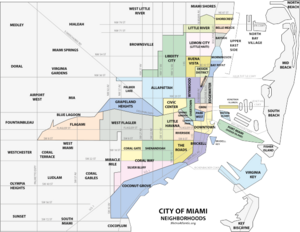Allapattah
| Allapattah | |
|---|---|
| Neighborhood of Miami | |

Westward view of Allapattah and North 36th Street (US 27) with historic Miami Jackson Senior High School visible right-center
|
|
| Nickname(s): A. P., Little Santo Domingo | |
 Allapattah neighborhood within the City of Miami |
|
| Coordinates: 25°48′54″N 80°13′26″W / 25.815°N 80.224°W | |
| Country | United States |
| State | Florida |
| County | Miami-Dade County |
| City | Miami |
| Settled | 1856 |
| Annexed into the City of Miami | 1925 |
| Government | |
| • City of Miami Commissioner | Wilfredo Gort |
| • Miami-Dade Commissioners | Lynda Bell, Bruno Barreiro, Jean Monestime and Audrey Edmonson |
| • House of Representatives | Luis R. Garcia, Jr. (D), Cynthia Stafford (D), and Carlos Lopez-Cantera (R) |
| • State Senate | Oscar Braynon (D) and Miguel Díaz de la Portilla (R) |
| • U.S. House | Ileana Ros-Lehtinen (R) |
| Elevation | 10 ft (3 m) |
| Population (2010) | |
| • Total | 54,289 |
| • Density | 11,399/sq mi (4,401/km2) |
| Time zone | EST (UTC-05) |
| ZIP Code | 33125, 33127, 33142 |
| Area code(s) | 305, 786 |
| Website | Allapattah neighborhood |
Allapattah is a neighborhood mostly in the city of Miami, Florida, and partly in metropolitan Miami, United States. As of May 2011[update], the county-owned portion of Allapattah, from State Road 9 to LeJeune Road, is being annexed by the city proper.
The neighborhood was nicknamed Little Santo Domingo in 2003 an effort spurred by former Miami mayor and longtime city commissioner Wilfredo "Willy" Gort to honor the sizable Dominican American population in the community.
The name is derived from the Seminole Indian language word meaning alligator. The initial settlement of the Allapattah community began in 1856 when William P. Wagner, the earliest documented white American permanent settler, arrived from Charleston, South Carolina and established a homestead on a hammock along the Miami Rock Ridge, where Miami Jackson High School presently stands. Development ensued from 1896 and into the 20th century in the area with the completion of the Florida East Coast Railroad (FEC).
Allapattah was predominantly populated by whites from early in the 20th century until the late 1950s, when there was a large influx of black Americans displaced by the construction of I-95 (then, the North-South Expressway) in the 1950s and 1960s, leading to white flight to suburban Miami-Dade County and Broward County. Cubans migrated to Miami neighborhoods like Allapattah in large numbers following the Cuban Revolution of 1959, hosting one of Miami's largest Cuban American populations. The 1980s brought influxes of Dominican Americans, Nicaraguans, Hondurans, and Haitians in the aftermath of various refugee crises in those nations. Now, a melting pot of residents from all across the Caribbean, Central America, and Latin America reside in the area.
...
Wikipedia
